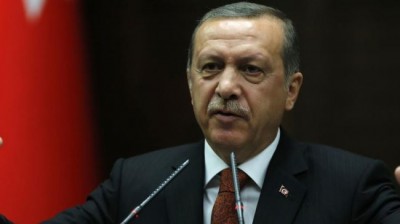Turkey’s “Military Multipolarity”: US Ally and NATO Heavyweight to Purchase Russia’s S-400 Air Defense System

The progress made on furthering the military dimension of Turkey’s multipolar grand strategy might be irreversible by this point after the US suspended the country from the F-35 training program and increased the odds that it’ll seek replacement warplanes from Moscow instead.
Acting Secretary of Defense Shanahan decided over the weekend to begin the phased suspension of Turkey’s participation in the F-35 training program after sending a letter to his counterpart detailing the steps that will be undertaken to finalize this process by the end of July, but then the US unexpectedly moved the schedule forward and reportedly banned Turkish pilots from flying these planes on Monday. It’s unclear why this abrupt change was made but it might be because the US figured that it’s better to begin removing Turkey from the program as soon as possible after Ankara made it clear that it won’t reconsider its earlier decision to purchase Russia’s S-400 air-defense systems, claiming that American analogues don’t satisfy its needs but that this doesn’t necessarily mean that it intends to worsen ties with the US.
The Pentagon obviously feel very differently about that and regards Turkey’s moves as threatening because it believes that the S-400s could endanger the F-35s that might fly over its notional NATO ally’s airspace. Therein lies the crux of the problem, however, because a serious security dilemma has begun to affect American-Turkish relations after the US started providing military support to Syrian Kurdish groups that Ankara regards as terrorists and then shortly thereafter was accused of being involved in the failed summer 2016 coup attempt against President Erdogan. Turkey can’t trust the US anymore, and purchasing Russia’s S-400s might be seen by it as an “insurance policy” for averting the worst-case scenario of American or allied airstrikes in the event that it goes to war with “fellow” NATO member Greece and/or Cyprus over disputed but reportedly energy-rich maritime territory.
There’s a suspicion that the US might be able to secretly reprogram any air-defense systems that it sells to Turkey to mask Greek, Cypriot, and its own own warplanes in the event of a conflict and therefore make them invisible to the defending forces, while Washington obviously couldn’t do this when it comes to the S-400s, hence why it’s so afraid of Ankara purchasing them. With Turkey on its way out of the F-35 program as punishment for its refusal to reconsider its agreement with Russia, it’s since been reported that it might go a step further in buying Su-57s from it as a replacement, which would make the progress that it’s achieved in the military dimension of its multipolar grand strategy irreversible by more closely tying it together with its northern Great Power neighbor.
The Russian-Turkish Strategic Partnership is therefore strengthening at the expense of the American-Turkish one, which is obvious to all objective observers and was made possible through Moscow’s deft application of “military diplomacy“, or in other words, its ability to peacefully leverage military means to advance diplomatic goals. In this instance, simply agreeing to meet Turkey’s military needs with the S-400s following its fallout with the US was enough to set into motion a larger chain of events that worked out to its grand strategic interests, though it must be remarked that Turkey is merely in the midst of this larger process and has yet to fully succeed with it. As such, the country is extremely vulnerable to externally provoked instability attempts designed to offset its “rebalancing” act, ergo the economic crisis of the past year for example.
Going forward, the military aspect of Turkey’s multipolar grand strategy appears to be a fait accompli, with the S-400 deal likely going down in history as a watershed moment for both Mideast geopolitics (due to the Russian-Turkish Strategic Partnership that it advanced) and NATO (seeing as how the aforementioned came at the expense of the American-Turkish one). It’s still theoretically possible that the US might pull out all the stops and resort to some Hybrid War trickery in a last-ditch attempt to either stop this process before it’s finalized or punish Turkey for its success, but the fact of the matter is that this might inadvertently lead to the further strengthening of the Russian-Turkish Strategic Partnership in response and the acceleration of what might now be Ankara’s irreversible pivot to the East.
*
Note to readers: please click the share buttons above or below. Forward this article to your email lists. Crosspost on your blog site, internet forums. etc.
Andrew Korybko is an American Moscow-based political analyst specializing in the relationship between the US strategy in Afro-Eurasia, China’s One Belt One Road global vision of New Silk Road connectivity, and Hybrid Warfare. He is a frequent contributor to Global Research.

